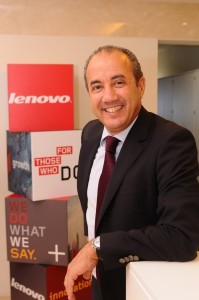
Amid a declining global PC market, Lenovo seems incredibly upbeat about its regional prospects. Perhaps that has something to do with the response the vendor has seen to the new Lenovo Partner Network.
On December 12, 2012, Lenovo MEA launched the Lenovo Partner Network (LPN) programme, in the hopes of skilling up channel partners and strengthening relations across the Middle East. Composed of three membership levels – Member, Premium and Gold – the idea of the programme is to both attract new partners and to educate the existing ones on Lenovo’s products.
The success of the programme – which includes an online portal through which partners can access everything from targets to marketing tools – is imperative for Lenovo for two reasons. Firstly, the company wants to rise from being the number-two PC manufacturer in the region to become number one. This means growing its market share to double digits in every country.
Secondly, the vendor’s sales are 95 to 98-percent driven by the channel, according to Djillali Lahiani, MEA Channel Manager, Lenovo. If the partner programme fails to catch on as expected, then, it could be that Lenovo’s dreams of becoming the world’s number-one PC player could fall flat. Lahiani is upbeat, though, explaining that he has already seen a great deal of interest in the partner network.
“I think I’ve had more difficulty getting the guys I’ve known for a long time to join,” he jokes. “They all say that they know me, and they know everything, so it’s fine. But the new ones are right there. They’re there for the training, and they’re saying that they want to be with Lenovo. I saw a number of African partners on there. In fact, I was surprised at the number of people registering from these countries. One guy told me that he doesn’t want to miss the train.”
It’s no secret that Lenovo is doing well. In January, the latest preliminary results from IDC showed that Lenovo had grown its EMEA PC market share to 11.1 percent, posting year-on-year growth of 41.7 percent in a market that declined by 1.6 percent overall. Why wouldn’t the vendors be lining up to get a piece of such action?
But what kind of treatment can a partner expect by signing onto the LPN? For one thing, according to Lahiani, the programme enables much better contact between the vendor and its partners, providing the sense of being part of a community. Aside from that, partners are given tools such as marketing materials, pricing, documentation, training programmes and advice on how to identify and secure PC accessories.
Partners of any level can access the tools on the LPN portal, though quite how much attention Lenovo pays to them will depend on their level of membership. Member-level partners are managed by the distributors, given small numbers of units to sell, and that’s about it. But more advantages come with the Premium and Gold levels, Lahiani says.
“The Premium members are part of another access level of management,” he says. “That means we know them, we talk to them and we send them a target. They have access to the offers and we help them grow. The Gold level is where we have a direct relation with the partner, managed by the account manager. He has access to a dedicated team at Lenovo, and access to finance and marketing. We do co-marketing, we do co-events and we set up a clear map with them.”
There are, however, stipulations that must be addressed before a partner can quality for the Premium or Gold levels. To become a Premium member of the LPN, it’s necessary to sell at least 150 units per quarter. For Gold-level membership, the number is anywhere between 600 to 1,000 units per quarter, depending on the country. And at that high level, Lahiani claims that Lenovo can help its partners double its sales.
A potential partner could be forgiven for taking a sceptical stance on that claim, considering the state of the PC market. Yes, Lenovo might have shown stunning growth over the past year, but IDC recently said that fourth-quarter PC shipments in 2012 were down five percent on the same period in 2011. Analysts have said that PC users are shifting their consumption to tablets rather than replacing older PCs, and though Lenovo does make a number of tablets and convertible laptops, there’s no getting around the fact that it is a PC manufacturer.
But this doesn’t worry Lahiani, who says that PCs are still an essential part of the technological ecosystem. “The PC is at the core of anything to do with productivity,” he says. “Okay, we have some convertibles, but the core that makes your business will be the same. I remember that we dropped in PC numbers because sales of Netbooks were very high. Acer became number-one then, and you know what happened to them.”
Lahiani also points to emerging markets as big business opportunities, despite the global slump in PC sales. “For sure, there is growth potential in Africa,” he says. “In Brazil, the demand will be there in the future. In Nigeria, the penetration is very low, and yet this is a country with a population of 170 million people. Come on – they will use a laptop for their productivity.”
What’s more, Lenovo is looking to shift some of its focus from the enterprise world to the consumer market. Lahiani says that this market still offers huge growth potential, particularly in the MEA region. What’s more, Lenovo has invested in enough research and development to become a player across a number of segments, whether it’s smartphones, tablets, convertible tablets or straight-up laptops.
Lahiani might be something of an optimist, but only time will tell whether Lenovo can thrive in a declining market. For now, though, Lenovo knows that it needs its regional partners to buy into the benefits it says can be gleaned from the LPN. It has even organised a Middle Eastern roadshow to show its partners how the LPN works.
If Lahiani is correct in saying that over 250 resellers have already signed on, perhaps partners can feel comfortable in sharing his optimism. “People are really keen to know,” he says. “I’ve seen it on their smiling faces, and that’s really encouraging.”





